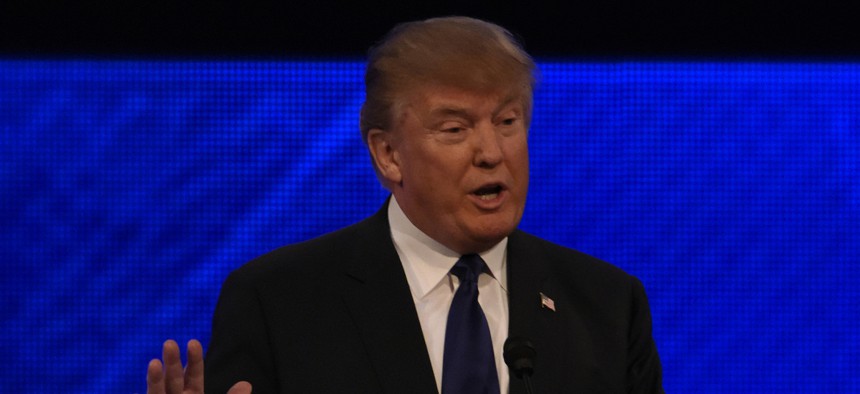Tech Hates Trump. What Does That Mean For the Pentagon?
An open letter from Silicon Valley leaders suggests a GOP victory would scuttle Ash Carter’s outreach effort.
If Donald Trump becomes president, much of the Pentagon’s recent progress in wooing Silicon Valley to defense work might come to a halt.
That’s one takeaway from the open letter published Thursday by 145 current and former executives from Facebook, Google, Slack, Twitter, Cloudera, and many more stalwarts of Silicon Valley.
“Trump would be a disaster for innovation,” the letter says. “His vision stands against the open exchange of ideas, free movement of people, and productive engagement with the outside world that is critical to our economy — and that provide the foundation for innovation and growth.”
Hostility toward a President Trump might also undermine outreach efforts by Defense Secretary Ash Carter, who has spent considerable time, energy, and money to persuade tech leaders and companies to put their talents to work for the U.S. military. Carter believes that harnessing commercial innovation from the Valley is crucial to maintaining American military superiority.
He’s become a frequent visitor to Silicon Valley, where he has enlisted some top minds for advisory boards, such as Google’s Eric Schmidt, and has established a Pentagon outreach base, the Defense Innovation Unit Experimental, or DIUx, to bring tech talent in closer and more constant contact with the Department of Defense.
So what would happen to Pentagon outreach under Trump?
“I think the Defense Innovation Unit Experimental would be much less likely to move forward in a Trump presidency,” said Alec Ross, one of the letter’s signers, author of the best-selling Industries of the Future, and a senior advisor on technology issues to Hillary Clinton at the State Department. “I think Silicon Valley will dial down its engagement with the Department of Defense in a Trump presidency. There is a lot of very justifiable mistrust in the technology community towards Trump given past statements about Amazon, Apple and others. The hatred Trump spews toward racial and ethnic minorities is asynchronous with the values of Silicon Valley.”
Reached by email, one technology thought leader familiar with the letter and many of its signers said the risk extended to national security.
“America remaining an innovation leader, particularly for technologies complementing the third offset, is currently an assumption, not a risk. To that extent, the risk of a Trump Presidency is a risk to our National Security,” venture capitalist and Presidential Innovation Fellow Eric Daimler wrote to Defense One.
While the letter does represent a good cross-section of Silicon Valley movers and shakers, some notable names are missing. Google co-founders Sergey Brin and Larry Page are absent, as is Apple’s Tim Cook. While Facebook co-founder Dustin Moskovitz lent his name to the letter, the better-known founder Mark Zuckerberg did not. (Mark’s sister Arielle did sign.) Yet in March, Cook, Page, Facebook co-founder Sean Parker and PayPal co-founder Elon Musk attended a closed-door meeting with top Republicans to express their concerns over Trump.
Another notable absentee is Peter Thiel, the venture capitalist who founded PayPal with Musk and who was instrumental in making Facebook what it is today. Thiel apparently harbors few reservations about the GOP nominee: he will be speaking at the Republican National Convention in support of Trump.




